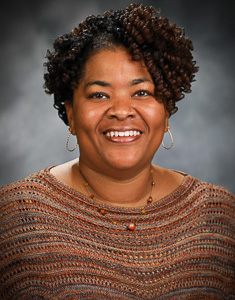Danett Cantey, Clinical Nurse Educator

Black History Month is an annual celebration of achievements of black Americans and a time for recognizing the central role of African-Americans in U.S. History. This month, we sat down with faculty, staff and students to discuss their entry into the nursing field, how they became nursing leaders and how to improve diversity in nursing.
Danett Cantey, MSN, RN, CNE, CHSE, clinical nurse educator, is a liaison for ABSN students and faculty. As a clinical nurse educator, she often teaches and facilitates skills and simulations.
Q: What inspired you to pursue the field of nursing?
A: I always knew I wanted to be in the medical field. I originally wanted to be a physician, but didn't want to go to school forever. So around my tenth or eleventh grade year in high school, I decided to become a physician assistant instead. Then my high school guidance counselor sparked my interest in becoming a nurse practitioner since their roles were quite similar and she thought I would be a good candidate to apply for some nursing scholarships. I received a NC Nurse Scholars loan and completed my BSN degree in 1999 from the University of North Carolina at Greensboro (UNC-G). After working as an RN in the hospital for three years, I began precepting senior nursing students and new graduate nurses. They all told me that I was very approachable, patient, liked to teach, and that I explained things well. So I decided to go back to school for a MSN-Nursing Education degree instead of becoming a nurse practitioner. I completed that degree in 2007 again from UNC-G.
Q: What is one thing either personally or professionally that you credit with making you who you are today as a nursing leader?
A: Everyone, usually knows me as the quiet, laid-back, and easy-going colleague to work with. I've been here six years now, and I'm still pretty quiet and reserved, but I've had to find my voice and really speak up and share my thoughts and feelings more among a lot of super passionate colleagues. People that I work with really do want to hear and value what I'm thinking or feeling, so I've had to become more confident and comfortable sharing my thoughts and feelings about various student or departmental issues. I'm sure this is all shaping me to become a better communicator as I continue to grow as a nursing leader.
Q: How do we continue to improve diversity in clinical practice, education, research, leadership, etc.?
A: I think we have to continue being mindful and intentional with recruiting and hiring minority staff, and making sure we have diverse voices at the table when decisions and changes are being made. Having a variety of people that can provide a different perspective based on ethnicity, gender, age, sexual orientation, role, rank, etc. provides input that in the end makes a difference for the communities where we live and work.